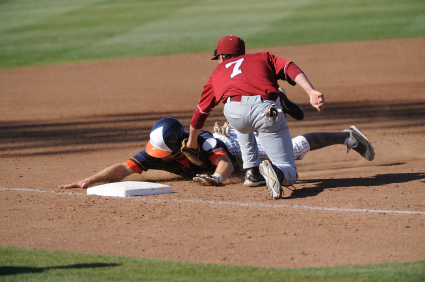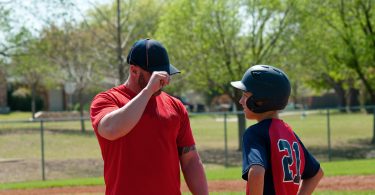Most college teams would like their third baseman to be a big hitter with above-average defensive skills. The prototypical third baseman in college is a HS shortstop with an above average bat who outgrows the position or doesn’t have the range to stick at short in college. Unlike professional baseball, however, you’ll see players with lots of different skill sets playing third.
The key to being a collegiate third baseman is being a good situational thinker. As a third baseman, you’ll be responsible for a lot of the plays put on by your team. In many programs, you’ll call the bunt plays, and be one of the main actors in them. You’ll always have huge responsibilities for first and third plays. You are going to have to be one of the captains of the infield and will have to be aware of the hitter’s situation on every pitch.
Defensively, third base requires a lot of different skills. You will need to have quick reactions for hard hit balls, not be afraid to get in front of a ball to keep bad hops in front of you, and be good at coming in on the ball and reading hops. Having above average arm strength is a big plus. More than anything, third basemen need to be able to play below the ball and not bat an eye at the hard hit ball, which must be routine. Opposing teams will have scouting reports that include your defensive strengths and weaknesses at third base. If you don’t crash well on bunts, they’ll exploit that. At the ‘hot corner’, where balls get on you quick, you’ll also need to be able to make split second decisions without hesitation. In college, you need to learn to compensate for your weaknesses at third base. Quality positioning and reading swings is a huge skill. Cheat in on players that can play the short game. Hug the lines to cut off the double on righties that are dead-pull hitters. As a third baseman, you can take away hits by being smart and moving just a step or two in any direction depending on the hitter.
As a hitter, third basemen usually stereotype as the middle of the order, RBI guys. This is far from universal. Teams use different types of guys at third, depending on the choices they have. But the most common third baseman is going to be a run producer. If you really want to play third, a solid bat is a must. Learn how to have a successful approach at the plate with runners in scoring position. This does not mean you have to hit balls into the gaps and out of the ballpark (although that’s always a plus!). It means you have to know how to take a good at bat with a runner at second or third. A run producer does not blink when the pressure is on. When there are runners in scoring position, a good hitter has to stick with his approach and not get overly excited. A hitter who tries to do too much in that situation will get himself out. A hitter who tries to barrel balls to the middle of the field to pick up his hits and RBIs will have success.
If you want to be a third baseman at the college level, be realistic with yourself right now about your strengths and weaknesses. If you think that you’re both offensively and defensively sound, focus on situational play, or the mental game. Third base is a well-rounded position. Make yourself into a well-rounded player.







